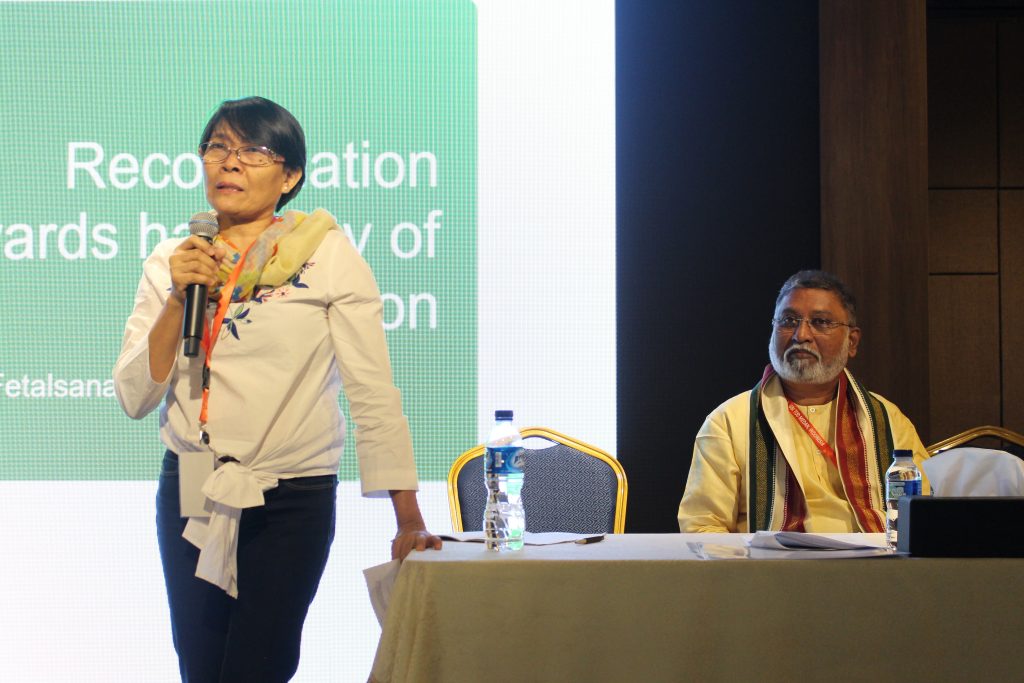‘Resistance hermeneutics’ and ‘resistance theology’ can be a powerful tool in recovering life-sustaining indigenous worldviews, tells Filipino woman theologian at CATS-IX

“Resistance hermeneutics’ and ‘resistance theology’ can be powerful tools in recovering life-giving and life-sustaining indigenous worldviews that can provide an alternate lens in re-examining dominant theologies and doing contextual theology”, stated Filipino woman theologian Dr Lily Apura at the Congress of Asian Theologians (CATS)-IX being held in Medan, Indonesia.
Delivering the second thematic address on ‘Reconciliation: Towards the Harmony of Creation’, at the CATS-IX, Dr Apura said, “In history, imperial drive for power and wealth are the cause of the subjugation and colonization of weaker peoples and nations throughout the world. Death, destruction, disease, and misery accompanied the imperialistic advances in Asia, Africa, and Latin America. In the former colonies, Christianity is still associated with hegemonic powers. This leads to a distortion in the understanding of Christianity’s essential message,” said Dr Lily Apura, a professor at the Divinity School of Siliman University in the Philippines.
Through a reinterpretation of Biblical texts, Dr Apura visualised ‘a feminine God’ whose life-giving nature manifested all ‘beings’ into creation. “God in Genesis is portrayed as a mother of all organisms; like a mother, God creates a home for all. As a mother and homemaker, God gave humankind the vocation to be motherly and maintain the Earth as the home for other creatures.”
A pertinent point Dr Apura brought back in focus was Sophia theology. She verbalized how Wisdom was personified as a lady ‘who is at peace with oneself and the world, lives by what she believes to be right, continually subjects herself to the pursuit of what is beautiful, true, just, and right’. Wisdom, she stated, was what held the universe together by its moral order.
Dr Apura then extended her ideas and redefined the concept of sin- “Sin, in wisdom, is thus the loss of the fear of the Lord; which results in alienation, pain, labour, and death. Sin destroyed the harmonious symbiotic relationship in the whole cosmos – a corruption for which human beings are responsible.”
Providing the example of Christ on the cross, Dr Apura stated that the ‘hope of liberation of the perpetrators and of dismantling of sinful structures rests on the forgiveness and liberation of the perpetrator by the victim’. Forgiveness, she said, was the harder choice; “It holds the victimiser accountable, it recognizes pain, but it is a choice not to allow pain and victimisation to dictate one’s life and actions.” Just like Jesus, the ‘humble and meek of the earth can turn their victimisation into a gift’.
Dr Apura’s radical approach generated serious discussions among the participants.
Venerable Mahamuni Sritha Mahagatha, a Hindu monk from Nepal who was also in attendance at the session, commented: “Forgiving one’s enemy does not only mean being friends with the oppressor; but forgiving also means forgetting.”
Dr. Immanuel Mathew Thathapudy of the Senate of Serampore University moderated the session.
More than 120 theologians from across Asia are participating in CATS-IX, which is being held in Medan, North Sumatra in Indonesia, and hosted by Gereja Bethel Indonesia Medan Plaza.










